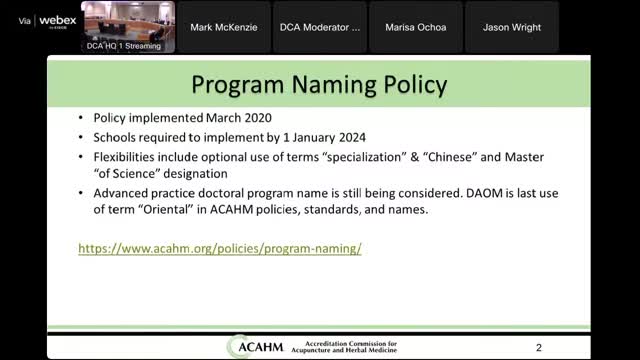Board and stakeholders debate degree titles, entry‑level doctorate and national standards
Get AI-powered insights, summaries, and transcripts
Subscribe
Summary
Board members, the accreditor and representatives of colleges and associations discussed program naming, whether an entry‑level doctorate should be the standard, and how California’s requirements compare to other states. Stakeholders urged more outreach and a clear path for public understanding.
The naming of acupuncture and Asian‑medicine degrees, and whether an entry‑level doctoral degree should replace the master's as the professional entry point, was a recurring theme in the March 7 meeting.
Representatives from the Accreditation Commission for Acupuncture and Herbal Medicine (ACOM) explained the commission’s program‑naming policy (effective Jan. 1, 2024), which requires titles that clarify whether Chinese herbal medicine is included. Mark McKenzie and Jason Wright said ACOM policy allows several naming permutations (for example, “Master of Acupuncture and Herbal Medicine” or “Master of Science in Acupuncture and Herbal Medicine”) and that a small number of advanced programs retain older naming conventions that ACOM is still reviewing.
Several public commenters, college leaders and board members urged further work toward an entry‑level doctorate. Thomas Kuo, president of the Council of Colleges for Acupuncture and Herbal Medicine, and other college representatives said the council is discussing strategic plans and professional alignment but that the profession remains divided on a single national standard. "If the profession as an entity on a national level were to make a strong push for an entry level doctoral to be the license eligibility avenue…that would be valuable stakeholder input," ACOM staff said.
Board member comments reflected the tension between state and national standards: members said California could pursue clearer labeling or standards that help physicians and consumers understand clinicians’ training without prematurely imposing a single national requirement. Several public commenters asked the board to create clearer public‑facing materials showing what each degree title and program length means for patient access and practitioner qualifications.
Why it matters: Degree titles influence employer expectations, referral networks and consumer understanding. Because states set licensure and the national accreditor sets program standards, alignment among schools, accreditor and licensing boards determines how degree titles translate to practice privileges and public recognition.
Ending: The board asked staff to pursue outreach and suggested inviting California schools and associations to discuss naming and training levels at a future meeting. No regulatory change was adopted; stakeholders urged a coordinated national conversation led by professional organizations and accreditors.
